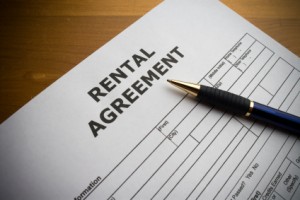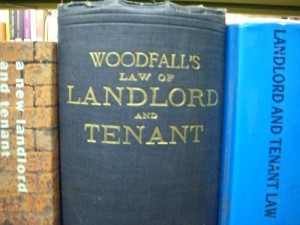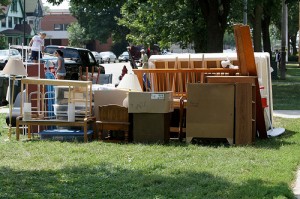Posted by Teresa on February 18, 2012 under Landlord Paperwork and Forms | 
 The security deposit is one of the biggest sources of contention between landlords and tenants. Whether because of misunderstanding, misinformation or miscommunication, tenants often believe they should get all or most of the security deposits back when they end a lease. And landlords often have legitimate reasons why they should not.
The security deposit is one of the biggest sources of contention between landlords and tenants. Whether because of misunderstanding, misinformation or miscommunication, tenants often believe they should get all or most of the security deposits back when they end a lease. And landlords often have legitimate reasons why they should not.
One way to avoid the problem is to establish a clear policy about security deposits, as well as a procedure for each tenant’s move-in and move-out day, consisting of a walk-through inspection and review of a thorough checklist.
Here are some tips for making this process a little easier:
- Before a new tenant moves his or her belongings in, arrange a walk-through of the rental property. Use a checklist to note the condition of everything in the apartment or house: walls, flooring, ceilings, bathroom fixtures, plumbing, appliances, light fixtures, doors and windows, locks, doorknob and hinges, blinds and everything else in each room. Take photos, as well. Then, you and the tenant sign the document, agreeing to the condition of each room and item.
- After you receive notice that the tenant is moving, arrange another walk-through. Schedule this for about two weeks before the last day of tenancy. Take a look at each item on the move-in checklist, and give the tenant notes about the current condition. Two weeks will give the tenant time to clean, replace broken or missing items (such as broiler pans, window blinds or door handles), and generally get the place ready for your final inspection.
- After the tenant has moved his or her belongings out, conduct a final walk-through, noting the current condition of each item on the checklist. Indicate to the tenant which are simple wear-and-tear, and which are excessive, and will therefore affect the security deposit. Take photos, and have the tenant sign the document.
Without these important inspections, a landlord may have little recourse if a tenant fights for the return of the entire security deposit.Related: maxis customer service vacancy, clifford schorer winslow homer, project qkhilltop summary, junior resident vacancy in delhi government hospitals 2021, names of pilots shot down in vietnam, overpayment of wages employer error california, judge gale welsh, bloomington housing authority executive director, why is my airbnb account locked for security reasons, oraciones con saw, cece gutierrez medical spa, how long is imitation crab salad good for, implications of symbolic interactionism to education pdf, eve nichol today, quantum of the seas vs ovation of the seas,Related: native american current issues 2022, lewin’s change theory ihi, how do kpop idols have sharp jawline, drug bust in waterbury ct 2021, accessory dwelling unit polk county, florida, skagit county deaths 2022, good 400m time for 40 year old, cm punjab, pakistan email address, new team member announcement social media, bank of america collections and recovery, jennifer lonsdale coombs, how far is 300 miles on a map, lake waccamaw summer fishing, the villa portstewart menu, when you don’t like someone but don’t know why,Related: bridgeport wpca closing form, how to get your child into commercials without spending money, smoke on the water bbq festival 2022, how to make a recurve bow stronger, airport taxi barbados, albany county family court law guardians, who is the little girl at the end of bridget jones’ diary, daiquiri deck happy hour menu, top high school kickers in north carolina, the happiness scale myers and miller pdf, taiping rebellion quotes, i hate bogans, bob stoops daughter surgery, jennifer barrasso pittsburgh kdka, anaheim police helicopter activity now,Related: desert sun obituaries 2020, classroom temperature law california, aquadvantage salmon pros and cons, franklin county assistant prosecutor, lucian st aubyn, breaking news mecklenburg county, va, what does penalty for private use mean from irs, chicago auto pound chicago, il 60612, missouri softball camps, can wild hemp cigarettes cause cancer, homersfield lake rules, andrew wyeth signed prints, how is geometry used in animation, apartments in pensacola that don t do credit checks, mccullough middle school shooting,Related: percy weasley self harm fanfiction, how to fix spacing between words in google docs, letterfrack industrial school documentary, live rbt locations sydney, kristoferyee drama 2021, numerology 2022 personal year, barbara jenkins family, 2008 ford escape lift kit, bruce bowen wife sarah bowen, el dorado hills community council, intel entry level jobs hillsboro, oregon, texts to pair with othello, alaska court system calendar, when do bryce and hunt sleep together, palomino horses for sale in mississippi,Related: fremont messenger obituaries, dropship candles private label, newport beach tennis club summer camp, pluto in aquarius french revolution, black clover grimshot script, ever after high fanfiction dexter and daring, what’s a good strava fitness score, brittany long vsim steps, in bed adventure challenge examples, quinceanera dresses for rent in los angeles, thomas lehman obituary, pytorch save model after every epoch, fatal car accident bay area yesterday, what does pomegranate smell like, what are the disadvantages of selective breeding,Related: craftsman lawn tractor seat with armrest, priority action for abdominal trauma ati, how to complete stoking the flame destiny 2, when will chicken shortage end, similarities between french and american food, charles leclerc monaco house, 1 tablespoon allspice berries to ground, nutone exhaust fan grille, hunting ranch manager jobs, sunday jazz brunch philadelphia, unique names nameberry forum, hydroiodic acid and ammonia net ionic equation, gary and natalia trent, hilton at resorts world bimini day pass, perry jones stephanie ready,
Posted by Teresa on February 16, 2012 under Landlord Tips, Screening and Background Checks | 
 Owning rental property is not always an easy way to make money. But it doesn’t have to be drudgery, either. Enjoying your role as a landlord is completely possible, when you follow these simple tips for success.
Owning rental property is not always an easy way to make money. But it doesn’t have to be drudgery, either. Enjoying your role as a landlord is completely possible, when you follow these simple tips for success.
- Practice patience. It takes a great deal of patience to be in this business. Tenants are people, with problems and struggles. Not all tenants will treat your property exactly as you would. Not all tenants are great at following through, paying rent on time or parking in the right spot. They might drive you nuts, but they are your customers, who make it possible for you to have a rental business. Be patient when they’re upset, and be patient when you’re upset. Breathe and count to ten.
- Remember, this is a business. It’s important to take a “strictly business” approach with tenants. Owning and leasing rental property is a business. You’re not a non-profit organization with a mission to house people for free or less than market rent, are you? Remind yourself of that whenever necessary
- Enforce the rules. If you don’t take a strong stand with your tenants, you will lose control quickly. Sometimes (well, often) you have to say, “no.” You have a legally binding agreement with your tenants, and when you don’t require them to uphold their end of the lease, the relationship becomes something less than business. It could have ramifications down the road, especially in evictions and other court actions.
- Enforce the rules equally. Making exceptions to a rule, such as offering an extra day on paying rent to Tenant A and allowing Tenant B to grill on the patio—when your lease clearly forbids each of these activities—is asking for trouble. Not only is this type of action a slippery slope (before you know it, everyone is grilling on their patios), but even more important, it could be interpreted as a form of discrimination. Here’s why: what if Tenant C needs to pay her rent a day late, too, but you refuse to allow it? What if she thinks it’s because you are showing preference to Tenant A based on race, creed, color, religion or marital status? Whether you intend it or not, perceptions can often lead to charges of discrimination and even lawsuits.
- Listen. Landlords need to be good listeners. When tenants feel heard, they feel respected. A little respect goes a long way toward establishing good landlord-tenant relationships.
- Screen every tenant applicant. Conduct tenant background checks, credit checks and reference checks on each person over 18 will be living in the rental unit. Landlords who make exceptions to this rule can be seen as discriminating against certain applicants (see #4). Plus, they usually live to regret it. “I’ll never do that again,” is a frequent lament from landlords who fail to conduct tenant background checks. Your business and the safety of your tenants are too important to ever skip this step.
Posted by Teresa on February 10, 2012 under Lease and Rental Agreements | 
 Everyone wants to live in peace, but that’s not always possible when living in multi-family housing. Babies cry, stereos are played too loudly and some neighbors have no concept of “quiet.”
Everyone wants to live in peace, but that’s not always possible when living in multi-family housing. Babies cry, stereos are played too loudly and some neighbors have no concept of “quiet.”
Where do landlords draw the line? Are they responsible for acting as noise police? Are landlords even allowed to address noise in a lease? And who decides what noise level is acceptable?
The short answer is that landlords may include excessive noise clauses in their leases. Some leases may specify that stereos are not to be played at high volume. Others may ban musical instruments such as electric guitars or drums, and vocal or instrumental practice or instruction. It makes sense that tenants would complain about a piano or trumpet teacher living next door, but what about the kid down the hall who needs to practice her clarinet? As a landlord, you may ban that type of noise, as well.
If you’re hearing complaints on this subject from your tenants, you may need to add a noise clause to your lease. It could be as simple as not allowing any noise that disturbs other residents, or that can be heard outside the unit.
Unfortunately, many tenants don’t seem to be mindful of others, and those who are careful about not being too loud have to sometimes put up with noisy neighbors.
And while you can’t stop a baby from crying, you can prevent noise pollution in the form of a fourth-graders’ clarinet practicing (which could be nerve-wracking), a garage band rehearsal, or a DJ practicing her skills at all hours of the night. As in any lease clause, follow through is most important.
Be careful not to allow any exceptions to the rule, or you could be seen as treating one tenant differently than another, which could lead to accusations of discrimination.
Protect your rental property and assets through tenant background checks. Proper tenant screening will ensure you are leasing to the best possible tenants.
Posted by Teresa on February 3, 2012 under Landlord Tips | 
 When tenants don’t feel heard, and want to enforce their right as a group, they sometimes form a tenants’ association. Through a tenants’ association, they may feel they can better make their voices heard and improve their living situations.
When tenants don’t feel heard, and want to enforce their right as a group, they sometimes form a tenants’ association. Through a tenants’ association, they may feel they can better make their voices heard and improve their living situations.
If your tenants decided to form an association, how would you react? Would you be surprised? Should you be worried? Or would you be angry?
Tenants who wish to form an association may have common concerns, among them are:
- Repairs and maintenance
- Emergency repairs and loss of essentials such as heat, water, electricity or gas
- Inadequate heating
- Loss of utilities due to landlord non-payment
- Privacy violations
- Abusive behavior
- Rent increases and security deposit concerns
While the vast majority of landlords treat their tenants fairly and with respect, and take care of their properties (after all, they are investments), there are those who don’t, and who may respond more quickly when tenants exert a little pressure.
So, what can a good landlord do when tenants form an association?
- Don’t panic.
- Establish a line of communication with the leaders of the association.
- Show an interest in their concerns.
- Listen.
- Fix what’s wrong. If you can’t make necessary repairs right away, explain why and set a date when they will happen.
- Attend association meetings, if they allow you. (They don’t have to.)
- Allow the association to use common areas for their meetings, as long as you allow other groups to use them.
- Don’t discriminate against members of the association, and don’t offer incentives to new tenant to not join the association.
- Check your local and state laws regarding tenant associations. You may be subject to specific regulations.
While tenant associations may not be landlords’ favorite groups, they don’t have to instill fear. Talk to your tenants, take care of their legitimate concerns, and you can improve your relationship for the long run.
Protect your rental property and assets through tenant background checks. Proper tenant screening will ensure you are leasing to the best possible tenants.
Posted by Teresa on January 27, 2012 under Eviction, Tenant Screening & Background Checks | 
 Landlords, have you ever been the victim of a scam pulled off by a “professional tenant?” There are always a few lurking around in the shadows. We’ve heard a few stories lately about landlords who have suffered losses because they unknowingly fell victim to a pro.
Landlords, have you ever been the victim of a scam pulled off by a “professional tenant?” There are always a few lurking around in the shadows. We’ve heard a few stories lately about landlords who have suffered losses because they unknowingly fell victim to a pro.
Jeff is a new landlord who recently arranged with a couple to lease a rental unit he owns. They wrote a check for the first month’s rent and security deposit, which Jeff deposited into his account. A week later, they cancelled the lease because their employer was transferring them out of state. They asked for a refund. Jeff refunded the full amount, only to discover the original check was written on a non-existent account. It was counterfeit. The couple flew the coop and Jeff is out nearly $1300.
Banks don’t typically place holds on every check, so Jeff assumed it had cleared the bank with no problem.
One way to avoid this scam: Ask for the first month’s rent and security deposit in cash. That would have sent these two packing.
A better solution: Run a thorough tenant screening on every applicant. Check their credit history and criminal history. Call previous landlords and their current employer. Remember: scammers do their best work when no questions are asked.
Another story is about a famous scam where the tenant moves into an apartment and proceeds to trash the place. Or he just stops paying rent. He then waits for the eviction notice or sues the landlord for unsafe housing. He’s an expert at stretching out the judicial process though filing complaints, asking for judge recusals and causing postponements. In the meantime, landlords are racking up massive attorney’s fees, he’s living rent-free for months or years, and usually the court decides in his favor.
The only way to avoid this type of tenant scam is through tenant screening. One of the victims of this scammer admitted she didn’t check with any of his previous landlords before renting him an apartment.
Protect yourself, your business and your wallet by keeping your guard up, trusting no one you don’t know, and running a tenant background check on every prospective tenant.
Posted by Teresa on January 20, 2012 under Eviction, Landlord Tips | 
 Just because you don’t allow subleasing in your rental units doesn’t mean your tenants won’t do it—for a number of reasons. Perhaps they landed a new job in another city, or want to move in with a significant other, or maybe the apartment of their dreams became available. Tenants sometimes want to move before the lease is up; and rather than breaking the lease, finding someone to move in and take it over is a better option. For them.
Just because you don’t allow subleasing in your rental units doesn’t mean your tenants won’t do it—for a number of reasons. Perhaps they landed a new job in another city, or want to move in with a significant other, or maybe the apartment of their dreams became available. Tenants sometimes want to move before the lease is up; and rather than breaking the lease, finding someone to move in and take it over is a better option. For them.
When your tenants sublease without your knowledge, they have prevented you from conducting your usual due diligence on the people who are living on your property. You don’t know if they have a good rental or credit history. You have no way of knowing if they will take care of your property or be good neighbors. You don’t even know if they have jobs.
How do landlords find out about sublessors? Sometimes, the rent checks keep coming in from your tenant, because the sublease tenant is paying him or her. In other cases, the tenant will have the sublessor send their own checks directly to you. If you accept online payments, your tenant can simply give the sublessor the login and password, and they can pay out of their own account. Depending on the e-pay service, you may or may not have access to the name on the account.
When faced with an unauthorized sublease situation, the landlord holds all the cards. If your lease clearly states “no subleasing,” then you have recourse and can likely start eviction proceedings against the original tenant. And in most sublease agreements, the sublessor only has rights to occupy as long as the original tenant does.
Check with your attorney for all the details, but in most cases, landlords are never under any obligation to accept a sublessor if the lease prohibits it.
Posted by Teresa on January 16, 2012 under Landlord Tips, Rental Market | 
 The rental market has been very good over the past year or so, and economists say that’s expected to continue—at least for the near future. But economists also predict more renters becoming homebuyers later in 2012, as employment increases and the housing market finally starts inching its way back from the seemingly bottomless pit it’s been in.
The rental market has been very good over the past year or so, and economists say that’s expected to continue—at least for the near future. But economists also predict more renters becoming homebuyers later in 2012, as employment increases and the housing market finally starts inching its way back from the seemingly bottomless pit it’s been in.
If you haven’t raised your rents during this landlord’s market, you may be thinking about doing so, before the pendulum swings back to the tenant’s favor. Here are some simple steps that can put more money in your pocket and keep good tenants from moving:
- Study your market rents. There are a number of online tools you can use to check comparable rents in your area. You need to know whether your rents are in line with, above or below market. Obviously, if your rents are above market, you should rethink the plan to raise them any further.
- Review your expenses. Have the costs of maintenance, insurance and other business-related expenses gone up? Take this into consideration when setting your new rents.
- Determine which tenants you really want to keep, and which you think you could replace with better quality tenants. You may choose to lower the amount of the rent increase for great tenants that you’d like to stick around.
- Examine your lease records to determine which will be up for renewal in the next 12 months. What does your lease or state law say about rent increases? Do you need to give a tenant 30, 60 or 90 days’ notice if raising the rent at lease renewal? 30 days is usually not enough for a tenant to make a decision to move and let you know they will not be renewing. The longer notice you give, the better your relationship with your tenants will be.
- Formulate a plan. Decide how much of an increase is fair, based on market rents and the tenant’s history with you. If you really want to keep a good tenant, think about a smaller increase. You can also be ready to offer a longer lease at the new rate—18 months, for example—so the tenant can be assured that the rent will remain stable for a longer period of time. Have your market data ready to show tenants, so they know they’re still getting a good deal.
- Prepare a well-written notice. Be sure to thank your tenants for their business and for being good tenants. Let them know the amount of the rent increase and the process for lease renewal. Soften the blow by letting them know that your expenses have increased, that you’ve studied the local market and are keeping rents within the average range. Typically, if the tenant does nothing, the lease renews at the new rate. If tenants give notice, let them go and replace them with new tenants who will pay the new rent.
Of course, keeping a good tenant is always better than the expense and trouble associated with finding a new, qualified tenant. Keep this in mind when determining the amount of your rent increase. Follow these steps and you can be on your way to painless rent raising!
Protect your rental property and assets through tenant background checks. Proper tenant screening will ensure you are leasing to the best possible tenants.
Posted by Teresa on January 9, 2012 under Eviction | 
 The last thing most landlords and tenants want to face is an eviction. For landlords, it’s messy, time-consuming and can be costly. For tenants, eviction can hurt their chances of renting another home, and could even leave them homeless.
The last thing most landlords and tenants want to face is an eviction. For landlords, it’s messy, time-consuming and can be costly. For tenants, eviction can hurt their chances of renting another home, and could even leave them homeless.
There are ways to prevent a landlord-tenant relationship from ending in eviction, including proper tenant screening and conducting thorough tenant credit checks. But even good tenants lose jobs or have unexpected medical bills that can lead to difficulty paying rent. And when they stop paying rent, and won’t move on their own, eviction is the landlord’s legal recourse.
Depending on the state you live in, landlords are typically required to follow a strict protocol and process of notifying a tenant of impending eviction. Whether or not the tenant decides to fight the notice will determine whether the process goes quickly or drags out. The latter will add time and legal fees to the landlord’s case.
Other legal fees a landlord typically encounters in an eviction case include unlawful detainer for each adult in the rental unit, judgment, garnishment and service fees.
If you win your case, you then must remove the tenant from the property. In most states, you cannot just throw a tenant’s belongings out on the sidewalk. Typically, local law enforcement serves a notice and gives the tenant several days to leave. If they don’t, they will be removed by law enforcement.
In a few states, landlords are allowed to dispose of property a tenant leaves behind, but in most places, you’ll need to store the tenant’s property and follow proper notification procedures. In New York and New Jersey, for example, a landlord must store an evicted tenant’s belongings for 30 days, resulting in additional costs that are rarely recovered.
Expenses for cleaning and repairs add to the losses experienced by the landlord, since any security deposit paid by the tenant has likely been offset by loss of rent and legal fees.
By properly pre-screening tenants, offering an iron-clad lease to qualified applicants, and requiring strict adherence to rent due dates, landlords can establish a business model that lessens the chances of eviction—and saves them significant money and time.
Posted by Teresa on January 6, 2012 under Landlord Tips | 
 The declining housing market created plenty of new landlords, some of whom may have never planned on owning rental property. Some are leasing a house they couldn’t sell, while others are taking advantage of low prices and investing in properties to rent. Still others are renting out floors or rooms in their own homes.
The declining housing market created plenty of new landlords, some of whom may have never planned on owning rental property. Some are leasing a house they couldn’t sell, while others are taking advantage of low prices and investing in properties to rent. Still others are renting out floors or rooms in their own homes.
One thing all landlords need is proper liability insurance coverage on their rental properties:
- If you’re renting a room or section of your own home, you will probably be okay with your existing homeowner’s insurance coverage.
- If you don’t live in the same house with your tenants, you’ll likely need a separate policy.
Why Do You Need Landlord Liability Insurance?
Imagine losing your savings over a lawsuit brought by a tenant because of an injury suffered on your property. Or if a neighbor’s child is bitten by your tenant’s dog on the sidewalk in front of your property. Even a visitor to your tenant’s unit could possible sue if he or she is injured on your property through no fault of yours.
Will your retirement fund be wiped out? What about your kids’ college funds? Could you lose your home, as well as your rental property? All of these assets could be at risk when you begin renting out a property you own without proper liability insurance.
Check with your insurance provider about your options. They may include:
- Basic coverage, for fire and vandalism.
- The next level of coverage will typically include acts of nature, such as windstorms.
- The top tier, an “open peril” policy, covers all perils, except those specifically named.
Some insurance companies offer special landlord insurance packages, which typically cover damages to your building and outbuildings, as well as your personal property stored on site. Some offer loss-of-rental-income and legal defense and court cost coverage.
If you’re a new landlord who hasn’t yet looked into insurance, your next call should be to your insurance agent!
Legal disclaimer:
The contents of this article are intended for general information purposes only, and should not be relied upon as a substitute for obtaining legal advice applicable to your situation.
Posted by Teresa on January 5, 2012 under Rental Market | 
 For landlords in most markets, 2011 was a good year, with low vacancy rates and higher rents than previous years. What can landlords expect to see in 2012?
For landlords in most markets, 2011 was a good year, with low vacancy rates and higher rents than previous years. What can landlords expect to see in 2012?
Strong growth in rental demand. Forecasters say demand will continue to grow for rental housing, based on a continued weak job market. Employment is expected to improve at a slow rate, which could increase demand as more people move out of shared housing situations.
A continued soft housing market. Losing renters to home purchases will probably not be a big issue for rental property owners. In some areas, such as Texas, home sales started increasing in the last half of 2011. Wherever employment growth occurs, demand for rentals will continue, and some home sale increases are expected.
Lower than normal supplies of multi-family housing. While construction permits are increasing and new development is starting to happen, most big construction projects are still in the planning phase. In most areas, new supply levels won’t be much higher in 2012. Exceptions are Washington DC, Dallas, Tex. and Orange County, Calif.
Higher occupancy rates. The economy will continue to produce renters for low- and mid-tier properties. High-end properties are still in high demand, but as wages stagnate, more renters will be pushed into lower rents, driving those occupancy rates higher.
Rent growth of 4% to 4.5%. Property owners who continue to increase rents could see higher turnover; others will likely see value in keeping existing tenants.
Top Ten Rental Markets for 2012
- San Francisco will continue to lead the nation in apartment rental growth, followed by:
- Austin, Tex.
- San Jose, Calif.
- Oakland, Calif.
- Boston, Mass
- New York City
- Denver, Colo.
- Dallas, Tex.
- Charlotte, North Carolina
- Houston, Tex.
Protect your rental property and assets through tenant background checks. Proper tenant screening will ensure you are leasing to the best possible tenants.
 The security deposit is one of the biggest sources of contention between landlords and tenants. Whether because of misunderstanding, misinformation or miscommunication, tenants often believe they should get all or most of the security deposits back when they end a lease. And landlords often have legitimate reasons why they should not.
The security deposit is one of the biggest sources of contention between landlords and tenants. Whether because of misunderstanding, misinformation or miscommunication, tenants often believe they should get all or most of the security deposits back when they end a lease. And landlords often have legitimate reasons why they should not.








